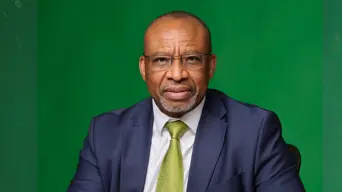Energy and infrastructure as the foundation of Africa’s just transition
Kopano Mohlala
20 November 2025 | 13:40Sponsored by Nedbank

In global forums, we have spent years debating the architecture of a just energy transition. The challenge now is not to broaden the conversation but to take more decisive action and improve delivery.
For emerging and developing economies, including those in Africa, the transition requires affordable finance at scale, must be sequenced sensibly and anchored in credible private and public institutions. Otherwise, it risks becoming another aspiration that fails to reach the people and communities it is meant to serve.
At its core, a just transition is a practical commitment: to decarbonise while expanding energy access and security, to protect the vulnerable, create opportunity, and do so in ways that strengthen stability and inclusion. Achieving that balance calls for a sustained focus on fundamentals, sound policy, disciplined coordination, and an unwavering commitment to implementation that embraces intergenerational fairness and outlives any single economic or political cycle.
Delivering on this ambition depends on macroeconomic conditions that support long-erm investment. Stable inflation, predictable fiscal frameworks, and credible public finances are not peripheral issues; they are the foundation upon which confidence and capital formation rest. In a world of constrained budgetary space and rising debt-service burdens, countries must make careful choices about where and how they deploy scarce resources. A stable macro framework remains one of the most effective drivers of growth because it anchors expectations and lowers risk premia.
That stability, in turn, provides the confidence investors need to finance the physical systems that underpin the transition itself. This is particularly relevant as many African countries face the dual challenge of mobilising domestic resources while accessing affordable external finance. A credible and transparent policy environment remains the surest way to attract private investment into sectors that drive the transition, from renewable generation to logistics and digital infrastructure.
Reliableenergy and modern infrastructure are central to Africa’s growth story because they provide the physical and institutional scaffolding on which industrial transformation depends. Before any country can scale renewables or clean-technology manufacturing, it must strengthen the systems that make such expansion viable. Transmission, storage and cross-border interconnectors are the quiet enablers of progress. They reduce costs, attract investment and turn climate ambition into tangible development. Modernising these networks will demand significant investment, supported by effective public-private collaboration. Sequencing is essential: grids, storage and regulatory frameworks must come first so that generation can follow. When the backbone is credible, finance flows more readily and the cost of capital declines.
Yet even with stronger systems, ambition falters without affordable capital. Emerging markets require about USD1.6 trillion in clean-energy investment each year but receive well under USD1 trillion. By the early 2030s, this figure will need to rise to as much as USD2.8 trillion annually to stay aligned with a Paris-compatible pathway. The causes of this gap are well known: high-risk premia, shallow local capital markets, and inconsistent policy signals. Blended finance, guarantees, and local-currency instruments play a critical role in de-risking, but they work best when aligned with coherent national frameworks.
The Energy Mix and Just Transition Task Force has advocated country platforms that bring together policy, capital and capacity under transparent governance. When regulation is predictable and implementation disciplined, confidence follows, and finance rewards credibility.
Expanding supply remains a developmental imperative, given that more than six hundred million people across the continent still live without electricity. A balanced energy mix that combines renewables with pragmatic transition fuels such as gas and biofuels remains essential for reliability. The transition must therefore be additive, combining increased generation, improved efficiency and modernised networks that can serve households and industry alike.
Energy and infrastructure are not only enablers of growth; they are catalysts for industrialisation and long-term competitiveness. Africa holds a substantial share of the world’s critical minerals, which are vital to the energy transition, yet it captures limited value beyond extraction. With the right policies, this can change. By localising component production, investing in skills and integrating regionally, the continent can participate more fully in the emerging energy economy. Technology partnerships and open-innovation platforms can accelerate this process. The objective is not self-sufficiency, but strategic participation in global value chains, enabling African economies to be dependable producers and partners.
Finance can mobilise projects, but inclusion ensures that progress is both equitable and enduring. Women, young people and small and medium enterprises must be active participants. Procurement frameworks, targeted finance and skills programmes can embed participation from the outset. When inclusion is treated as an element of competitiveness rather than a social obligation, it strengthens both resilience and legitimacy.
Institutional credibility is what ties these elements together; it transforms inclusion and policy into lasting investor trust. The challenge for Africa is to maintain consistent implementation throughout these cycles.
Equally important is international cooperation. The success of the transition depends on mechanisms that channel finance, technology, and expertise to where they can have the most significant impact. Initiatives such as the G20 Capital Adequacy Framework, multilateral development bank reform, and the scaling of guarantee facilities aim to expand the pool of investable capital for developing markets.
Africa must continue to shapethese frameworks from a position of partnership, ensuring that the realities of our economies inform global decision-making.
Communiqués or policy statements will not measure success. It will be reflected in outcomes: megawatts connected, grids modernised, factories opened, and livelihoods improved. Each of these indicates progress from intent to implementation.
The B20 Energy Mix and Just Transition is championing a just energy system that is scalable, investable, and inclusive—one that empowers emerging markets to lead in the new energy economy. The global energy transition must deliver universal access, economic opportunity, and climate resilience—especially for emerging and developing economies (EMDEs). This means driving investment into flexible, technology-neutral systems that are tailored to national contexts and development goals.
Written by Daniel Mminele, Chairman, Nedbank Group, and Chairperson of the B20 Energy Mix and Just Transition Task Force
Get the whole picture 💡
Take a look at the topic timeline for all related articles.
Trending News
More in Local

20 November 2025 16:56
Women For Change: Re-classification of GBVF as a crisis a significant move in the right direction

20 November 2025 15:42
Johannesburg Water's R4 billion surplus not 'missing,' says Treasury and AG

20 November 2025 15:19
'They have severe adverse effects': SAHPRA on the sale of fake GLP-1 products













